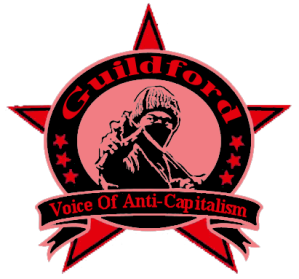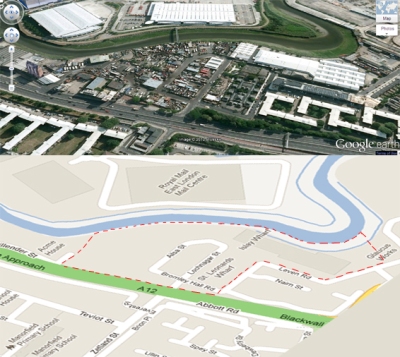 Leabank Project Ltd (A Not-For-Profit Ltd Company) Public Meeting.
Leabank Project Ltd (A Not-For-Profit Ltd Company) Public Meeting.
Stop The Alisa Street Waste Management Development!
February 18, 2012. Truissler Hall Community Centre, Poplar.
The VOAG has been on holiday in East London. And together with a local activist, attended a public meeting “To Consider the proposal of Tower Hamlets Council that land in Ailsa Street be reserved for a waste management facility, to assess the likely consequence of this, and to agree if possible on how best the people of Poplar may respond.”
The 5.8 hectare site comprises of a long strip of land running between the River Lea and the A12. At the north end of the plot lies ACME House and the A12/Glender Street junction. The Southern limit is adjacent to Aberfeldy Street. The site is dissected East-West by Alisa Street and Lochnagar Street, which run parallel to each other and divide the site in to a northern part and a southern part. Proposed waste facility site
Proposed waste facility site
The Northern half of the land is used for a mixture of industrial activities and a small waste transfer station. The Southern half is largely disused land, a former primary school and some warehousing. Within the area lies Bromley High School, a listed building, with two more graded buildings on its boundaries. The site borders the Aberfeldy and Teviot estates.
Tower Hamlets intends to use this space for a waste transfer station to eventually deal with the entire boroughs waste, estimated to be around 300,000 tonnes. The facility will receive the waste from domestic collection lorries and store it until it is carried off by larger vehicles for subsequent treatment or disposal. The plan will mean an extra 200 trucks will travel down the A12 and along the A13. Just south of the location, opposite the Aberfeldy Neighbourhood Centre, on land presently housing a gas works, there is a plan – already approved – to build a primary school, a housing development, and a public park to link up with the Lea River Park.
The Tower Hamlets Local Development framework, which calls for the waste site, says it must be “integrated in to its surroundings”. It “should minimise negative impacts on the environment, transport and amenities and respect the surrounding environment”. It should also “protect heritage assets on the site and surrounding area”; “address noise and air pollution”, “enable ‘activation of the river side”, and “improve walking and cycling access and connections”.
John Baker, the founder and director of Leabank Project, presented the case that the proposal for the waste transfer station made no reference to the planned gas works redevelopment. Neither plan takes account of the impacts one would have on the other. The waste management facility would negatively impact the development planned for the gas works site. He told the meeting that lorries entering and leaving the site would significantly increase traffic congestion and pollution along the A12 and A13. He said that the river side will suffer and access to it would be further restricted. For these reasons he believed the waste facility proposal was incompatible with the council’s own Local Development Framework, and there were better uses for such a river side location.


John Baker is also the treasurer and founding director of Tower Hamlets Council For Voluntary Service Ltd, a registered charity which is endorsed by the mayor and funded by the council. Its web site says it aims to “Provide ‘third sector’ organisations with the necessary support, information and services to enable them to pursue or contribute to any charitable purpose.” According to THCVS’ February e-bulletin, their Council funding was overdue and in a recent letter John Baker had asked the mayor for an assurance their funding wasn’t going to be cut.
Previously, in January 2006, John Baker was one of the founding Directors of New Mill Consultants. It was originally set up by Poplar HARCA – a large, not-for-profit, social landlord – as a group of residents to provide the government’s Guide Neighbourhoods Programme. The centrally funded programme is “awarded to social housing groups to “encourage regeneration, empower and include residents in planning decisions and promote a range of environmental and social benefits”. Once the residents group was established it incorporated as a company and operated independently of Poplar HARCA. After six months John Baker resigned.
New Mill founded the Linc Cafe as a drop in and advice centre. Its web site says: “the company provides professional courses and consultancy services to community and residents groups” and has helped to set up residents trusts. Between 2002 and September 05, John Baker was also a director of Poplar HARCA.
John Baker made the case that the riverside should be “recovered and developed with houses, shops and leisure facilities. I don’t even mind luxury flats” he said. “There should be protest and unanimous opposition to the plans”, But he continued: “the campaign must submit viable waste management alternatives. A NIMBY attitude will not be good enough to dissuade the council”. “What we need is more information, research and more residents’ participation”.
“The council has other vacant land available. Houses have been good investments recently in the area, due to environmental improvements and investment from the council and housing associations. If the plans go ahead property prices will fall. Public money spent on regeneration projects will also be wasted” John Baker said, “because the value of the investment will decrease with the property values. Businesses and landlords will also suffer”. “Poplar HARCA, many councillors, and the MP Jim Fitzpatrick have all stated their support for the campaign”.
“Tower Hamlets Council have been working on the proposals for months, yet the idea has never been discussed in public. Their scheme only came to light when it was included in the 212-page Tower Hamlets’ Development Plan Document (DPD) – part of the Local Development Framework – buried on pages 127-9 and 130!. There followed a wholly inadequate, six week consultation period during which most residents were unaware of the plans”.
I counted seventy people, seated in groups of five, around tables. Most were residents from the Aberfeldy and Teviot estates. There were four landowners, and a couple of ‘small businessmen’. Representatives from Poplar HARCA, one of whom was another director of Leabank Project, were also present.There were four councillors present. Three of them were on the board of Poplar HARCA. They all voiced their opposition to the plans. However, Cllr. Shiria Khatun pointed out that: “There was a shortage of alternative land. Transporting the waste out of Tower Hamlets would be costly and not the best environmental solution. There were options that could be looked at for example locating the facility underground or autoclaving the waste instead of moving or incinerating it.”.
Autoclaving, treats the waste by sealing it in tanks and passing high pressured steam through it. The majority of waste is biodegradable which is shredded into strands. There are presently no plants of this kind in the UK, and there is no market for the resultant biomass. Glasgow Council has been advocating large scale autoclaving, but recently distanced itself from the process, opening up its waste disposal contract to tenders with alternatives to autoclaving. Autoclaving is energy intensive, and since there is no market for the resultant biomass it usually ends up in land fill where it degrades to produce methane, a ‘greenhouse gas’.
John Baker, knew almost everyone in the meeting. In a gesture to the landowners, “who have not been allowed to develop or sell ‘their’ land, he said: ”Housing should be developed on the site, I don’t mind luxury flats, we need proper returns for the landowners. The Deputy Mayor, independent Councillor Ohid Ahmed joined in: “We want housing on the site, that’s what the developers want”. John Baker hands petition to Dpt Mayor Ohid Ahmed
John Baker hands petition to Dpt Mayor Ohid Ahmed
The Deputy Mayor giggled nervously and looked bemused as he addressed the audience. He was obviously unprepared to speak to the meeting. He said “the council did not support a waste facility in Poplar”. “After the Fish Island site was decided against as a location for the waste plant, we had to come up with an alternative place to put it – for reporting and central government purposes. – To fulfil our statutory obligations. We have no intention of actually putting it there”. He went on to say that many of the businesses in and around the proposed site were sited on illegally held land. The VOAG found these remarks astounding, but they went completely ignored and unchallenged.
One of the Landowners spoke to the meeting. He was a friend of John Baker. He suggested smaller waste sites spread across the borough as an alternative, which could be used to produce electricity or gas. “I’m not a business man, coming in from outside the borough just to make money.” he said.
Several residents spoke out from the floor. One said:”they’re not thinking of the residents, they just think about themselves.”. Another said:”we must persuade the council” Another resident called the estates “the forgotten estates”. Labour councillor, Rajib Ahmed, also spoke to the meeting. He said that London Thames Gateway Development Corporation (LTGDC) has the power to over-ride Tower Hamlets Council (THC). Cllr. Kosru Uddin, Development Committee member and board member of the (LTGDC) added: “The (LTGDC) is being disbanded in the Autumn. Some of its powers will be transferred to THC, whilst others will go to the newly formed London Mayoral Development Corporation, which will have to approve any plans of THC once the powers have been transferred.

Shiria Khatun, Councillor
Oddly it seemed, John Baker stressed several times that the mayor and the council were not responsible for the decision to build the waste plant. It was “down to an officers job and ‘administration”. John Baker was at great pains not to criticise the council executive especially the mayor. Cllr. Shiria Khatun addressed the meeting. “London Thames Gateway dictates that THC must have a plan for waste management, but it must take into consideration air quality and nature reserves”. She emphasised that it was the mayor and the executive that was responsible, not the “clerks and council officers” as John Baker had said earlier. “You must demand another meeting with the mayor” she urged the meeting. The Labour Councillor went on to suggest Leabank Project organise a lobby of the council and apply to speak to a council meeting.
Cllr. Khatun, together with another councillor was sitting at the same table as the VOAG. At one point she whispered in my ear “why don’t you speak, go on ask John Baker why he doesn’t want top blame the mayor”. Naturally, the VOAG said nothing. The VOAG has never been to a meeting quite like this. Hidden agendas hung like shadows between the lines of everyone that spoke. It has become clear to the VOAG since the meeting, that the reason John Baker is reluctant to criticise the mayor is because the mayor is holding the funding for the Tower Hamlets Council For Voluntary Service which John Baker is a director of.
The VOAG noted that although the councillors, one independent and three Labour, arrived more or less at the same time, they entered the hall separately and sat as far away from each other as possible. There was a tension between the councillors and also between two of the councillors and John Baker. The source of this tension and the issues behind it, are not quite clear to The VOAG – yet.It was all-in-all an intriguing meeting which left open many questions regarding a serious local issue. There were many different concerns and contradicting agendas represented. What did the councillor mean when he said “the council had no intention of putting the waste facility on the site”? Are the councillors seriously opposed to the project? What are the interests of the landowners? How does the close relationship between the various stakeholder organisations and the councillors effect the dynamics of the debate? And lastly; what on earth was the councillor referring to when he said “many of the businesses were sited on illegally held land”. But as you know: The VOAG is always watching!



You must be logged in to post a comment.